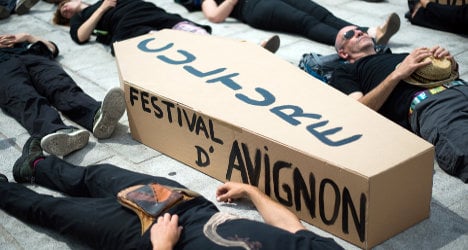The world famous Avignon theatre festival won't be officially cancelled this year, its organisers insist, but nevertheless there is a distinct possibility it might not go ahead.
“It may be prevented from happening, it may not take place, but it won’t be my doing,” festival head Olivier Py told French daily Le Monde this week.
Py is referring to the very real possibility that an ongoing strike by thousands of French performers and technicians, classed as "intermittents" will cripple the flagship festival, which is due to open on July 4th and run until the 27th.
With unions issuing a strike notice until the end of July dozens of the other cultural events that make up France's summer festival season are also in doubt.
Mediators are working to hammer out an agreement that works for unions representing intermittents, bosses and the government, but for the moment there’s been little good news. Although Prime Minister Manuel Valls said the government will back down on one of the key reforms, the rest, he said must go forward. Unions are fuming.
"If the government does not meet our demands with a fair and long-term plan that takes our proposals into account, the summer will not go as planned!" one union statement warned.
Under French law, some 250,000 “intermittents,” employed in the film, theatre, television and festival industry benefit from an unemployment plan system that continues to pay them in between their short term projects. It’s intended to support and promote France’s famed cultural industry.
SEE ALSO: Nude Performers accost French Minister

Unpopular reforms
But a new set of reforms aimed at saving money on this loss-making welfare programme are opposed by unions. Actor Jimmy Shuman, a general delegation member of labour union Syndicat Francais des Artistes-Interpretes told The Local artists and technicians are getting a raw deal.
He says the reforms will see taxes for workers and employers go up by one percent, while intermittents already pay double the rate that regular employees do. The reforms will also cap how much workers can make per month at €5,400 before taxes, which he said is a disincentive for workers to demand a decent wage.
The most controversial reform is one that would create a longer delay for intermittents before they can receive financial support from the government. However, Valls promised last week to temporarily stall its implementation in an effort to find a solution the intermittents can live with.
In Shuman’s view these changes put France’s cultural scene at risk.
“In the long term if you have fewer people available to make a living out of their art, their talent, then it’s going to be harder to have a broad cultural offering," he said.
"Right now you’ve got so many small companies that are able to irrigate the entire country with plays, with music. There is very vibrant culture scene even in the midst of the economic downturn," he said. "It's simply a way to allow people to survive."
Economic motor
France produces over 200 movies per year, making it the world’s fourth-biggest producer of film behind the United States, China and India. The money spent on producing the films are an economic motor, as are festivals like Avignon, which are a boon to hotels, restaurants and stores in the city.
Yet labour unrest has already cut into France’s cultural production once before. The Avignon festival was completely cancelled in 2003 during a previous intermittents strike over reforms to their benefits. It was the first and only time the show has been scrapped since its founding in 1947.
Festival chief Oliver Py, says he thinks the event can still be saved as long as the government and the unions keep talking, though he clearly puts some of the blame on the unions for the current impasse.
“They have got to get back together around a table, right away,” Py told Le Monde. “In political battles it’s not because we lose at first that we won’t win later. This agreement can be amended. It seems the government understands that. The other parties need to understand that too.”



 Please whitelist us to continue reading.
Please whitelist us to continue reading.
Member comments